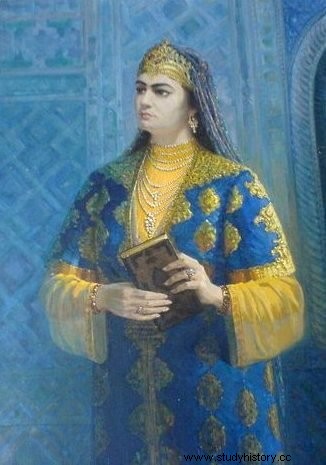Uzbek poetess and wife of a khan, Nadira (1792 – 1842) exercised the regency of the khanate of Kokand for ten years. She leaves many poems, dedicated in particular to women's issues of the time.
Khan's Wife

Nadira Mahlar-ajim was born into the family of the khan (ruler) Rahmankul-bek in 1792. A brilliant child, she received a quality education and studied literature, history, philosophy, languages. Quite young, she began to write poems in Uzbek, Persian and Tajik, which she signed Nadira, Kamila or Maknuna depending on the language.
Around 1810, Nadira married Oumar-khan, leader of the khanate of Kokand, located in a territory that today straddles Uzbekistan, Tajikistan and Kyrgyzstan; Oumar-khan has just granted himself the title following a conspiracy against his predecessor and brother, Alim Khan. The couple will have two children, and the marriage seems to have been happy. A lover of poetry, Oumar-khan also writes, under the name of Amiri.
Poetess and regent
Oumar-khan dies in 1822 and Nadira expresses her mourning and her sorrow in a cycle of poetry entitled “Song of separation”. His eldest son Mohammed Ali (Madali) being barely a teenager, it was Nadira who exercised the continuity of power for ten years. Intelligent and open-minded, she supports science, protects trade and makes the Kokand Khanate an artistic hotbed. She built hospitals, caravanserais and mosques, and remained adviser to her son when he took power.
Alongside the exercise of power, Nadira continues to write poetry, with a freedom of tone that makes fundamentalists cringe. In her writings, she notably evokes love, human and mystical, but also the living conditions and problems of women in Central Asia; subjects to which she is very sensitive, but which are often considered taboo. She will leave 10,000 verses divided into three diwans (collections of poetry), and exploring the different forms of oriental poetry, in particular the ghazal (love poem).
National heroine
Upon coming to power, Khan Madali strives to follow in his father's footsteps rather than his mother's. Like him, he leads an expansionist policy, which leads to war with the emirate, neighbor of rival, of Bukhara. In 1842, Emir Nasrullah Khan invaded the Khanate of Kokand, had himself recognized as ruler and captured Madali and his family.
Nasrullah Khan has Madali and her brother executed in front of Nadari. Accusing the poet of having broken the rules of Islam by having had a public life, he also hanged Nadira. She had, it is said, had refused to marry him.
Nadira remains considered in Uzbekistan as a national heroine and a martyr. The very first postage stamp of the country, after its access to independence in 1991, is dedicated to him.
“The Ruins of Separation”
Ah, I who am left on the ruins of directionless separation,
because the loved one does not come to the ruins of my shelter
I found no trace of you, suffering in the desert
so I sacrificed myself, returned once more to the house of sorrow.
I cried so much not to share the wine of your ruby lips,
that my vital force flowed like blood, drop by drop, from my eyes.
I was proud of her face when we met, but the twilight
burned my body with the flame of separation.
If I act crazy, don't blame me. The muse
faded from my sight, and the light of her gaze disappeared.
Nadira, in the wonder of this sun, I went mad,
My love has made itself apparent as the glory of time.
